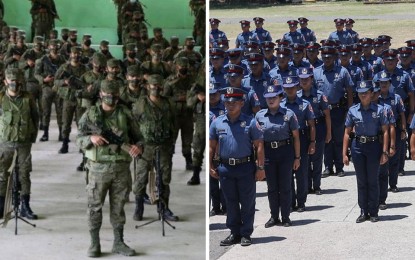
(File photo)
MANILA – President Ferdinand R. Marcos Jr. on Monday assured continued efforts to strengthen the country's police and military to ensure "strong and stable rule of law" as the foundation of the country's transformation.
"Our Police and Armed Forces are being strengthened and modernized, to be more effective in maintaining peace and order and in defending our sovereignty," the Chief Executive said in his second State of the Nation Address (SONA) at the Batasang Pambansa on Monday.
He also said the stiff campaign against illegal drugs continues, which he said has taken on "a new face" and is now geared towards community-based treatment, rehabilitation, education and reintegration, to curb drug dependence among the affected citizenry.
"Last year, we launched the 'Buhay Ingatan, Droga’y Ayawan' or BIDA Program, and established additional 102 Balay Silangan Reformation Centers nationwide," Marcos said.
While focusing on rehabilitation of drug dependents, Marcos vowed to continue the fight against drug syndicates by shutting down their illegal activities and dismantling their network of operations.
This includes going after law enforcers and their accomplices found implicated in the illegal drug trade.
"Unscrupulous law enforcers and others involved in the highly nefarious drug trade have been exposed. I will be accepting their resignations. In their stead, we will install individuals with unquestionable integrity, and who will be effective and trustworthy in handling the task of eliminating this dreaded and corrosive social curse. We cannot tolerate corruption or incompetence in government," Marcos said.
As this developed, the Chief Executive also said that the country is now nearing a peaceful solution to its problems concerning Filipinos who have taken arms against the government.
"For almost half a century, some of our fellow Filipinos have taken to arms to make their views heard. We are now at a point in our history when their armed struggle has evolved. We have now progressed together towards peace and development," he noted.
Marcos said the government had incorporated capacity-building and social protection into its reintegration programs, to guarantee full decommissioning of former combatants.
"Through community development and livelihood programs, the Barangay Development and Enhanced Comprehensive Local Integration Programs have been effective in addressing the root cause of conflict in the countryside," the President emphasized.
Amnesty
Marcos also said that he will issue a proclamation granting amnesty to rebel returnees to complete the reintegration process.
"I ask Congress to support us in this endeavor," the President said. Marcos is also pleased to note that five years after the Marawi Siege, communities there have started to recover anew with the completion of many projects and infrastructures aimed at improving the life of the citizenry.
He also said the government is now processing the granting of financial aid to those severely affected by the conflict. The assistance, Marcos said, will allow these residents to start fresh.
"Nawa’y mamayani ang pag-asa. Nawa’y magpatuloy ang pagkakaisa, pagmamatyag, at paghahangad ng kapayapaan at kaunlaran (may hope prevail, may unity continue along with vigilance and the desire for peace and progress)," he added.
Marcos also touted the progress achieved by the Bangsamoro Autonomous Region in Muslim Mindanao (BARMM).
"We are proud of the progress that the BARMM has taken. It will be self-governing, progressive, and effective," he added.
This progress, the Chief Executive emphasized, was made possible only because of the cooperation of all key groups.
"The local government, the royal families, the MNLF (Moro National Liberation Front) and the MILF (Moro Islamic Liberation Front) were all consulted and represented in the transition phase. The international community has also supported us in this smooth transition. Former adversaries are now partners in peace. Its functions have been defined, and its basic laws are being written," Marcos said.
With the progress of peace in the BARMM, the Chief Executive said the nation has strengthened its prospects for finally achieving sustainable progress anchored on a true and lasting peace in the southern Philippines.
"We will continue to support the progress of the BARMM, apace with our singular vision for all Filipinos," Marcos said.
Judiciary reform
Marcos also stressed the executive department's unqualified commitment to back reforms and efforts to modernize its co-equal branch, the judiciary.
"We fully support the Judiciary’s efforts to improve the justice system and to protect constitutional rights," the Chief Executive said, citing that a responsive and modern justice system is part of the crucial underpinnings of a new Philippine republic.
Chief Justice Alexander G. Gesmundo on Oct. 14, 2022, formally launched the Strategic Plan for Judicial Innovations (SPJI) 2022-2027, the High Court’s plan of action to address institutional challenges under the guiding principles of striving for timely and fair delivery of justice, transparency and accountability, equality and inclusivity, and technologically adaptive.
Under these principles, the Court targets three major goals: efficiency, innovation, and access in its service delivery.
Last December, the United Nations Office on Drugs and Crime (UNODC) and the high tribunal met to map out how the UNODC’s Anti-Corruption Programme can best support several activities under the SPJI.
These include a campaign for ethical responsibility, strengthening the Judicial Integrity Board, and enhancing public access to information and legal services.
The Chief Justice's vision includes modernizing court processes and operations, strengthening information and communication technology governance, management and operations, ensuring the effective use of data in policy and decision-making, and upgrading information sharing in the justice system.
In providing accessible justice for all, the Supreme Court has also vowed to enhance its public access to information and legal services, improve legal aid initiatives, strengthen the foundations of Shariah justice, and promote gender fairness and inclusivity. (with report from Benjamin Pulta/PNA)
